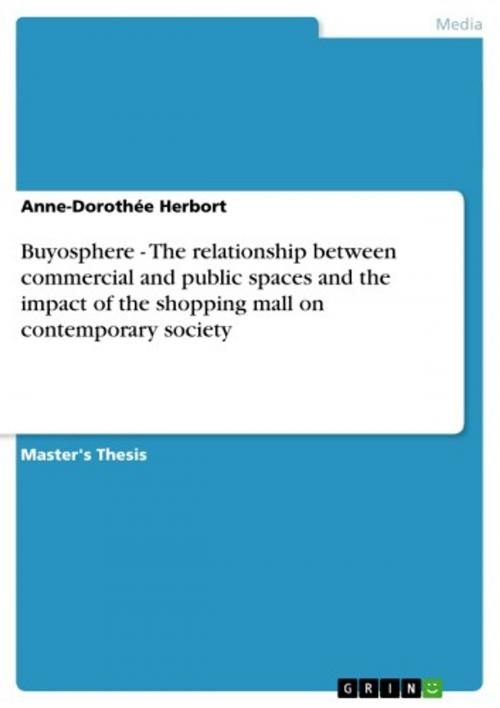Buyosphere - The relationship between commercial and public spaces and the impact of the shopping mall on contemporary society
Nonfiction, Art & Architecture, Architecture| Author: | Anne-Dorothée Herbort | ISBN: | 9783656146391 |
| Publisher: | GRIN Verlag | Publication: | March 6, 2012 |
| Imprint: | GRIN Verlag | Language: | English |
| Author: | Anne-Dorothée Herbort |
| ISBN: | 9783656146391 |
| Publisher: | GRIN Verlag |
| Publication: | March 6, 2012 |
| Imprint: | GRIN Verlag |
| Language: | English |
Master's Thesis from the year 2012 in the subject Art - Architecture / History of Construction, grade: 1.0, University of Lugano (Accademia di Architettura di Mendrisio), course: Antropologie, Architektur, language: English, abstract: A preliminary research carried out in 2009 on the shopping centre 'Serfontana' located at the traffic junction between Chiasso and Mendrisio, was the starting point for the following paper. I analysed the mall's characteristics and its attraction as a public place for teenagers. Shopping malls belong as much as urban sprawl, fragmentation and traffic congestions to the characteristics of the contemporary city. The analysis of effects and consequences of commercial spaces are therefore crucial to understand urban development, dynamics and future. Additionally, I would like to underline, that urban processes are not only influenced or fostered by architecture or landscape planning, but are also strongly engendered by social and cultural attitudes and their transformations. Hence, it is important to consider also the influence shopping malls have on society and public life. It is a critical study about facilities which are used daily and are part of the common urban landscape. The analysis implicates a thorough insight into the world of consumption in particular and the mechanism of 'superplaces' in general, focussing on their impact on changes of social habits and public space. Moreover says Marco Torres in his text, Luoghi magnetici, that studying the places of great attraction and popularity, where events, leisure activities, consumption and parties are held, might give advice on how to improve the unpopular, hostile, miserable and lifeless places. Further I would like to reflect about the development of the relationship between market and public space throughout the time. Finally, scrutinising Swiss shopping malls might give indications on contemporary acquisition behaviours and future development of the contemporary city and its commercial spaces.
Master's Thesis from the year 2012 in the subject Art - Architecture / History of Construction, grade: 1.0, University of Lugano (Accademia di Architettura di Mendrisio), course: Antropologie, Architektur, language: English, abstract: A preliminary research carried out in 2009 on the shopping centre 'Serfontana' located at the traffic junction between Chiasso and Mendrisio, was the starting point for the following paper. I analysed the mall's characteristics and its attraction as a public place for teenagers. Shopping malls belong as much as urban sprawl, fragmentation and traffic congestions to the characteristics of the contemporary city. The analysis of effects and consequences of commercial spaces are therefore crucial to understand urban development, dynamics and future. Additionally, I would like to underline, that urban processes are not only influenced or fostered by architecture or landscape planning, but are also strongly engendered by social and cultural attitudes and their transformations. Hence, it is important to consider also the influence shopping malls have on society and public life. It is a critical study about facilities which are used daily and are part of the common urban landscape. The analysis implicates a thorough insight into the world of consumption in particular and the mechanism of 'superplaces' in general, focussing on their impact on changes of social habits and public space. Moreover says Marco Torres in his text, Luoghi magnetici, that studying the places of great attraction and popularity, where events, leisure activities, consumption and parties are held, might give advice on how to improve the unpopular, hostile, miserable and lifeless places. Further I would like to reflect about the development of the relationship between market and public space throughout the time. Finally, scrutinising Swiss shopping malls might give indications on contemporary acquisition behaviours and future development of the contemporary city and its commercial spaces.















